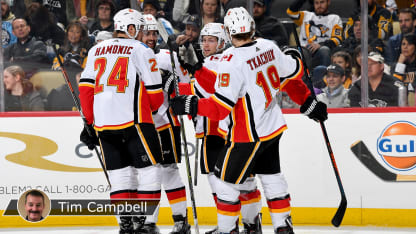Treliving said he continues to take the pulse of the market.
"You want to make sure you're exploring and looking for every opportunity to help your team but there's also an important time to make sure things are stable," he said. "It's a balance and you don't want change for change's sake."
Treliving spoke to NHL.com about the issues relevant to his team as the deadline approaches.
On the major attention rental players are receiving this season and his interest in them:
"Every year, there are players on expiring contracts and they always get attention. Each year, especially in this country (Canada), it becomes bigger and bigger, gets more attention. Traditionally, I haven't been a big fan of the rental market. Expending assets for something short in time, that's difficult in a cap-based system. We've spent picks before but all for players with term. We'll have to see how it plays out. You stay in touch with the marketplace and talk to other teams, but we'll wait and see and watch how things go. It can be a dangerous game, getting involved and spending a lot of assets for something that's real short-term."
On the pressures and the atmosphere surrounding a contending team this season:
"Anybody that's played or worked in a Canadian market knows the juice that goes with it. When your team is going well, it's an exciting time for the fan base. It brings an energy to the city we sometimes forget. We are constantly reminded of the importance the team plays in the every-day outlook of the city. A city can be energized, the citizens can be energized when the team is going well, and that's part of what sport is about. We have a large responsibility in helping people be a distraction for things that are going on around them and I think it's important, when things are going well, that you can feel that in your city. Conversely, when you're having a tough time, you feel that, too."
On how that "juice" may affect his approach to the deadline:
"From the management chair, you have to block that out. One of the big reasons you want to do well is so your city can have that juice -- but that can't play a role, be in the pressures or excitement. I always call it riding the wave. We can't ride the wave like the fans, the media and the local market do. You have to block that noise out because, quite frankly, it does not help you make sound decisions. There has to be some sterile work done, where you're keeping yourself quite a bit insulated. You try to block that noise out and really focus on the team and areas you might improve, balancing the short and long term. Of course, you want to invigorate your market and you want your fans to be excited, but you also have to have the blinders when it comes to the decisions. I can't drive the decision-making process, but you can certainly feel the buzz when the team does well."
On his confidence in the Flames' goalies:
"We have a veteran guy who's been through this before in Mike Smith, someone who has played playoff games and gone on a playoff run and has played important, meaningful games in the spring. And we've got a younger goalie who has really made a name for himself this season. David Rittich has had a tremendous year and we had great confidence in him. Many questions were asked of me last summer about upgrading the goaltending, but we didn't spend a whole lot of time on it. We had a lot of faith in David. Especially in that position, it takes time. He's a young guy who's gone through the proper steps, played in Europe, spent time in the American Hockey League, became a really good goalie there. His first year in the NHL last year was a good season. Did he skin his knee when Mike got hurt? Absolutely, but there are lots of good goalies in this League that have taken some time to go through that process. We felt the experience David gained last year not only helped him but that we'd be better off for it. We've been proven right on that."


















